外研版(2019)选择性必修 第一册Unit 2 Onwards and upwards Developing ideas & Presenting ideas & Reflection课件(125张
文档属性
| 名称 | 外研版(2019)选择性必修 第一册Unit 2 Onwards and upwards Developing ideas & Presenting ideas & Reflection课件(125张 | 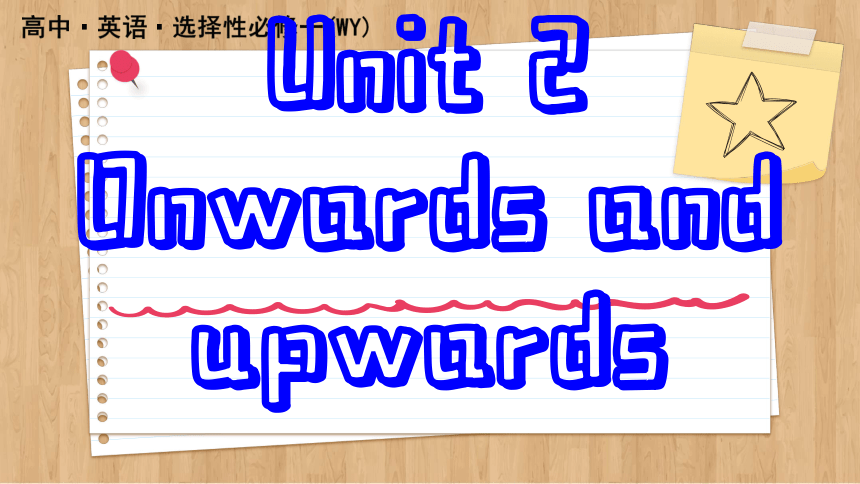 | |
| 格式 | pptx | ||
| 文件大小 | 75.9MB | ||
| 资源类型 | 教案 | ||
| 版本资源 | 外研版(2019) | ||
| 科目 | 英语 | ||
| 更新时间 | 2024-04-17 22:13:01 | ||
图片预览

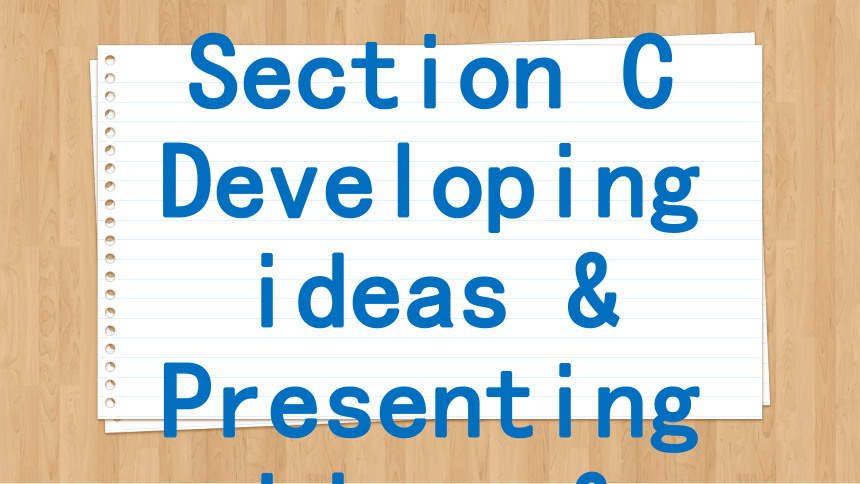
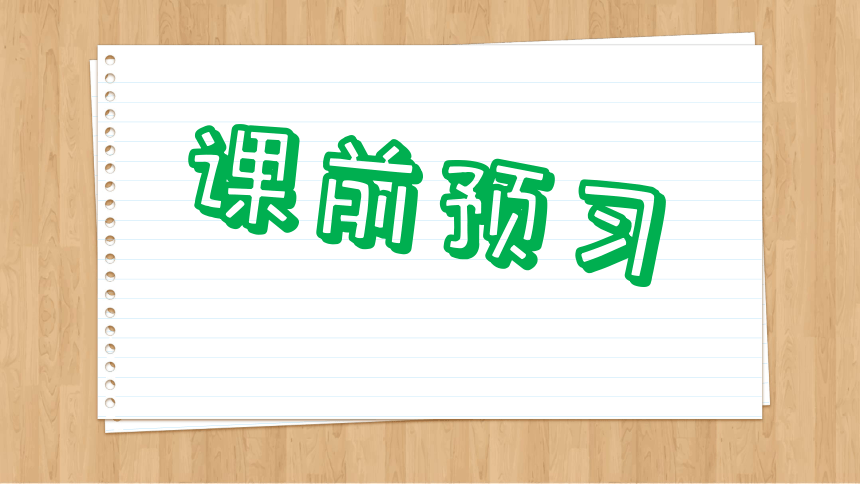
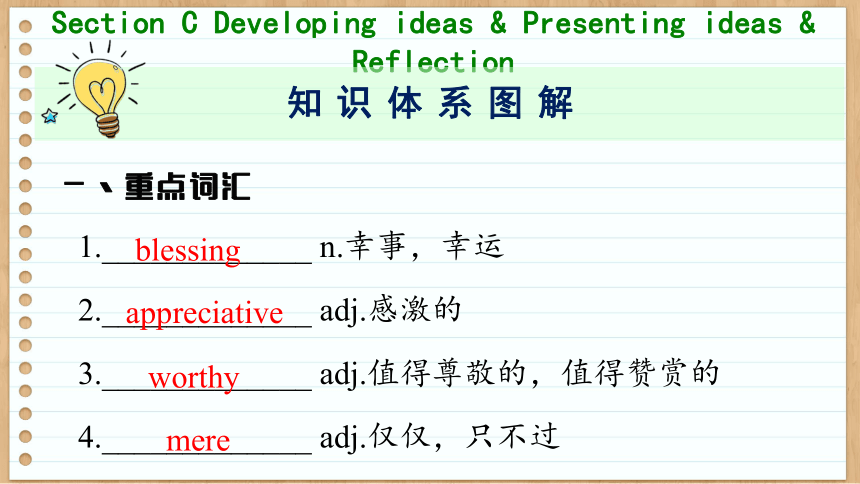
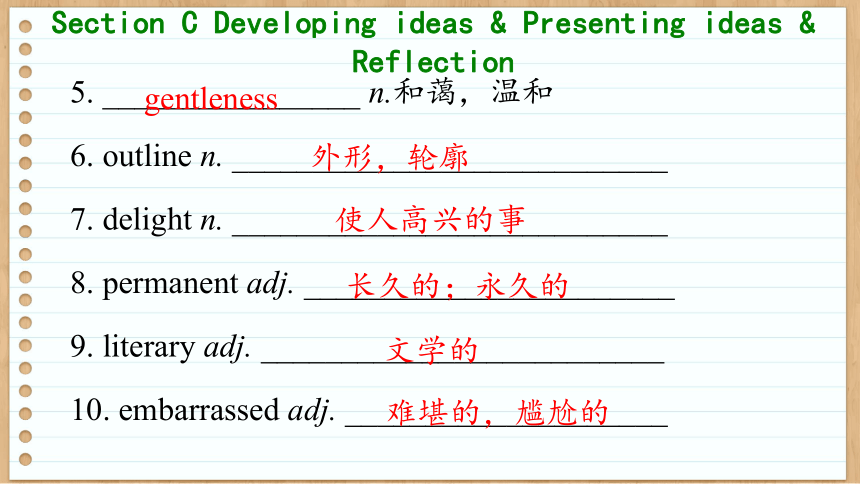
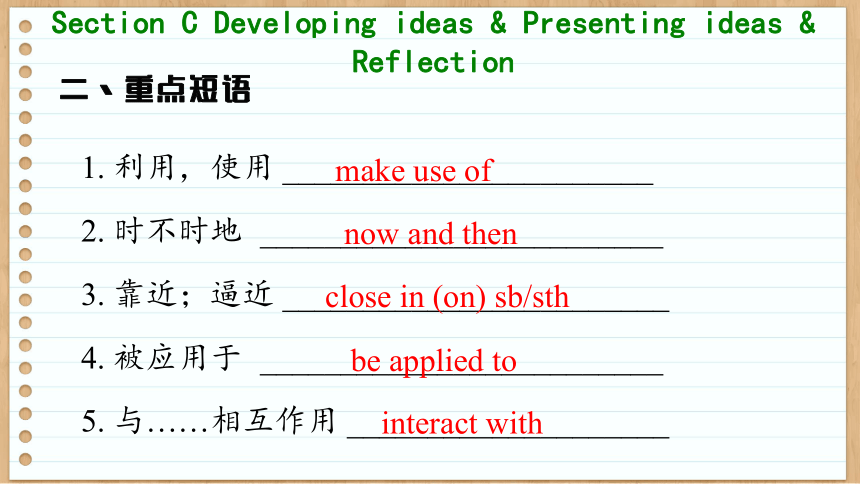
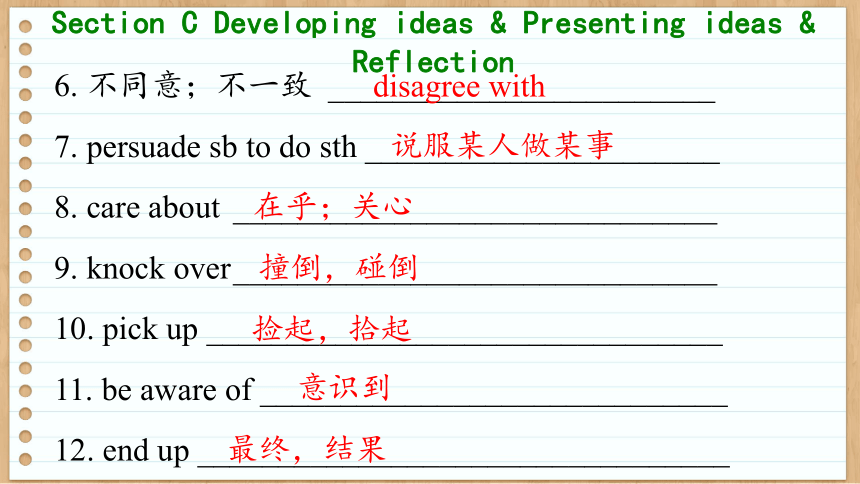
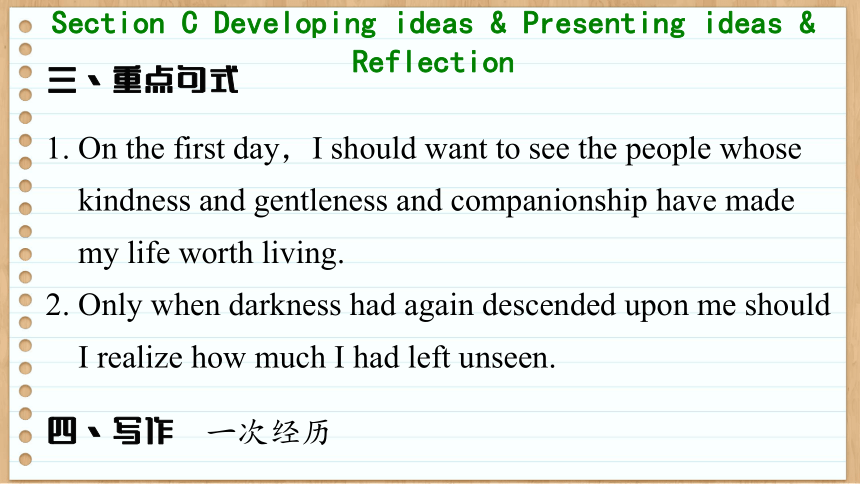
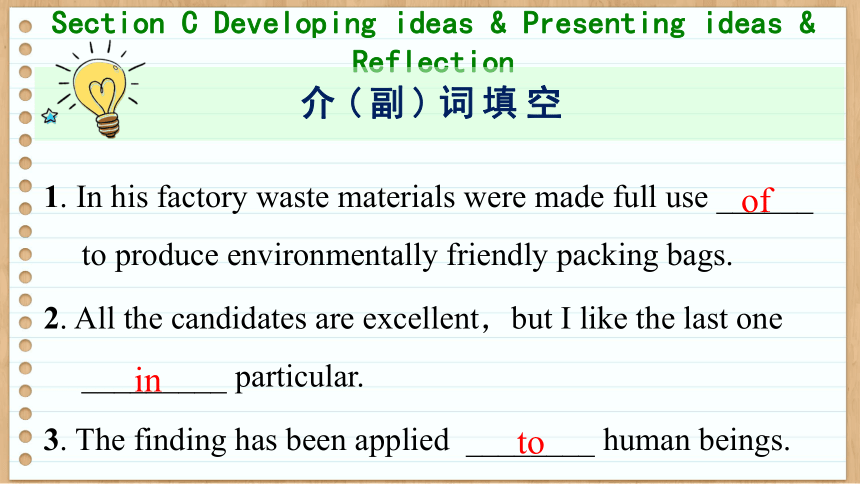
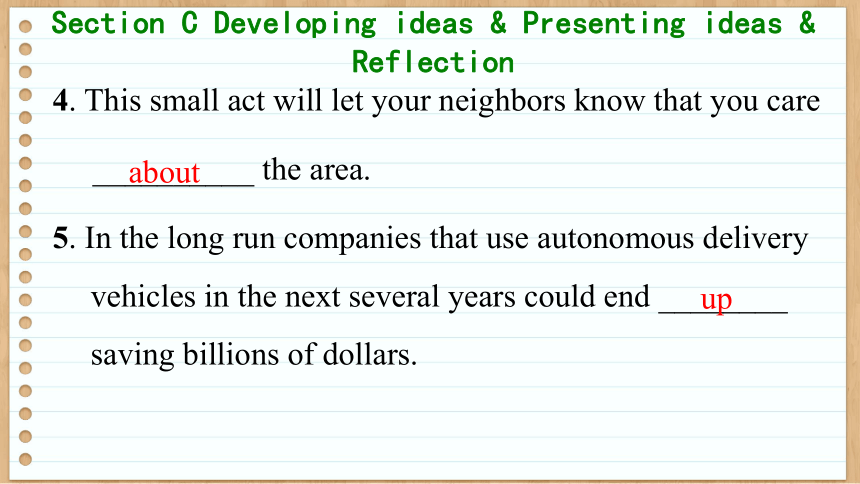
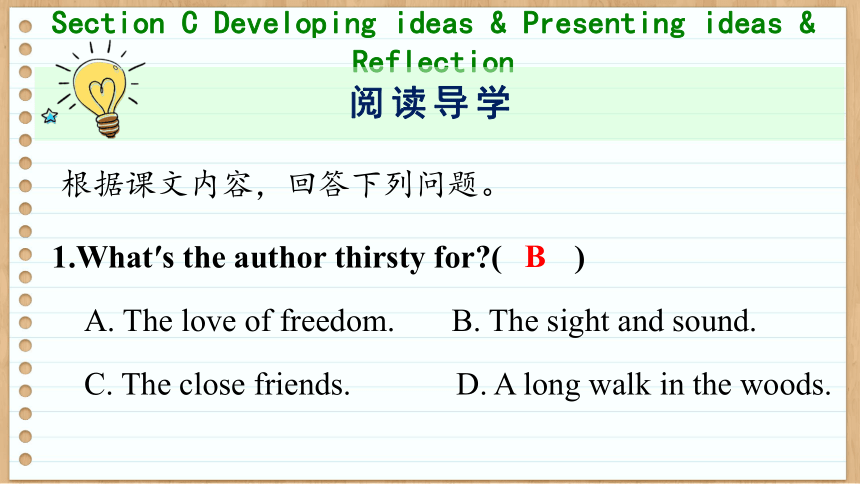
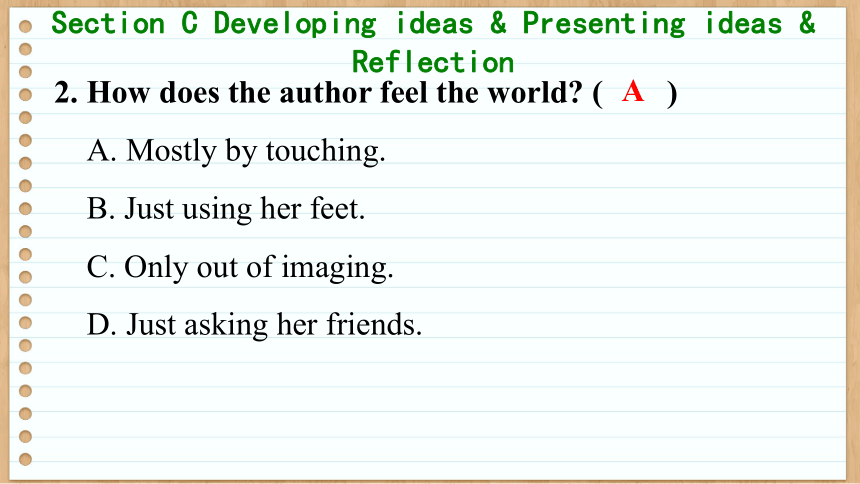
文档简介
(共125张PPT)
Unit 2 Onwards and upwards
Section C Developing ideas & Presenting ideas & Reflection
课前预习
知识体系图解
一、重点词汇
1._____________ n.幸事,幸运
2._____________ adj.感激的
3._____________ adj.值得尊敬的,值得赞赏的
4._____________ adj.仅仅,只不过
blessing
appreciative
worthy
mere
5. ________________ n.和蔼,温和
6. outline n. ___________________________
7. delight n. ___________________________
8. permanent adj. _______________________
9. literary adj. _________________________
10. embarrassed adj. ____________________
gentleness
外形,轮廓
使人高兴的事
长久的;永久的
文学的
难堪的,尴尬的
二、重点短语
1. 利用,使用 _______________________
2. 时不时地 _________________________
3. 靠近;逼近 ________________________
4. 被应用于 _________________________
5. 与……相互作用 ____________________
make use of
now and then
close in (on) sb/sth
be applied to
interact with
6. 不同意;不一致 ________________________
7. persuade sb to do sth ______________________
8. care about ______________________________
9. knock over ______________________________
10. pick up ________________________________
11. be aware of _____________________________
12. end up _________________________________
disagree with
说服某人做某事
在乎;关心
撞倒,碰倒
捡起,拾起
意识到
最终,结果
三、重点句式
1. On the first day,I should want to see the people whose kindness and gentleness and companionship have made my life worth living.
2. Only when darkness had again descended upon me should I realize how much I had left unseen.
四、写作
一次经历
介(副)词填空
1. In his factory waste materials were made full use ______ to produce environmentally friendly packing bags.
2. All the candidates are excellent,but I like the last one _________ particular.
3. The finding has been applied ________ human beings.
of
in
to
4. This small act will let your neighbors know that you care
__________ the area.
5. In the long run companies that use autonomous delivery vehicles in the next several years could end ________ saving billions of dollars.
about
up
阅读导学
根据课文内容,回答下列问题。
1.What′s the author thirsty for ( )
A. The love of freedom. B. The sight and sound.
C. The close friends. D. A long walk in the woods.
B
2. How does the author feel the world ( )
A. Mostly by touching.
B. Just using her feet.
C. Only out of imaging.
D. Just asking her friends.
A
3. From the fourth paragraph,what can we infer ( )
A. The author used to read by herself.
B. The author would take a short walk in the woods in the afternoon.
C. The author liked to meet her friends first.
D. The author would not sleep tonight.
C
4. What′s the biggest regret the author had in the three days ( )
A. The time spent in the museums.
B. The evening spent in the theatre.
C. The morning when she greeted the dawn.
D. So much left unseen.
D
5. What′s the best suggestion the author gave in the last paragraph ( )
A. To value what you own at present.
B. To admire what others have.
C. To go after the most delightful sense.
D. To develop the ability of touching.
A
课文呈现
Developing ideas
Look at the charts and answer the questions.
1
Percentage of adults with a disability in the US
Percentage of adults with a disability in the US
▅ People with a disability
▅ People without a disability
Percentage of adults with common functional disability
1 Are the numbers different from what you expected In what way
2 What special assistance can people with disabilities make use of in their daily lives
Read the passage and find out what the author would do if she could see.
2
1 I have often thought it would be a blessing if each human being were stricken blind and deaf for a few days at some time during his early adult life. Darkness would make him more appreciative of sight;silence would teach him the joys of sound.
2 Now and then I have tested my seeing friends to discover what they see. Recently,I asked a friend who had just returned from a long walk in the woods what she had observed.“Nothing in particular,”she replied.
3 How was it possible,I asked myself,to walk for an hour through the woods and see nothing worthy of note I who cannot see find hundreds of things to interest me through mere touch. If I can get so much pleasure from touch,how much more beauty must be revealed by sight And I have imagined what I should most like to see if I were given the use of my eyes,say for just three days.
4 On the first day,I should want to see the people whose kindness and gentleness and companionship have made my life worth living. I do not know what it is to see into the heart of a friend through that “window of the soul”,the eye. I can only “see” through my fingertips the outline of a face.
I should like to see the books which have been read to me, and which have revealed to me the deepest channels of human life and the human spirit. In the afternoon I should take a long walk in the woods and intoxicate my eyes on the beauties of the world of nature. That night,I should not be able to sleep.
5 On my second day,I should like to see the pageant of man′s progress,and I should go to the museums,I should try to probe into the soul of man through his art. The things I knew through touch I should now see. The evening of my second day I should spend at a theater or at the movies.
6 The following morning,I should again greet the dawn, anxious to discover new delights,new revelations of beauty. Today I shall spend in the workaday world,amid the haunts of men going about the business of life.
7 At midnight permanent night would close in on me again. Only when darkness had again descended upon me should I realize how much I had left unseen.
8 I who am blind can give one hint to those who see:Use your eyes as if tomorrow you would be stricken blind. And the same method can be applied to the other senses. Hear the music of voices,the song of a bird,the mighty strains of an orchestra, as if you would be stricken deaf tomorrow. Touch each object you want to touch as if tomorrow your tactile sense would fail.
Smell the perfume of flowers,taste with relish each morsel,as if tomorrow you could never smell and taste again. But of all the senses,I am sure that sight must be the most delightful.
(Excerpts from “Three Days to See” by Helen Keller)
Choose the author's purpose in writing the passage and give your reasons.
3
1 To help readers understand what it is like to be blind.
2 To make readers without disabilities appreciate what they have.
3 To persuade readers to care about the blind.
Think Share
1 What are the main wishes of the author Give an example.
2 Do you know of any stories about people with disabilities Share one with the class.
3 How should we interact with people with disabilities
4 What qualities do both reading passages in this unit convey
Read the sentences from the passage and answer the questions.
4
Use your eyes as if tomorrow you would be stricken blind. And the same method can be applied to the other senses. Hear the music of voices,the song of a bird,the mighty strains of an orchestra,as if you would be stricken deaf tomorrow. Touch each object you want to touch as if tomorrow your tactile sense would fail.
1 What sentence structure is used repeatedly What figure of speech is it
2 How does this technique help to express the author′s emotions
Now make your own sentences using this technique.
Work in groups. Give a talk about your opinion on the sentence from the passage.
5
... it would be a blessing if each human being were stricken blind and deaf for a few days at some time during his early adult life.
1 Read and discuss the meaning of the sentence and decide whether you agree or disagree with it.
2 Organise your talk and make notes.
3 Give your talk to the class
Now think about your performance during group discussion. Did you actively participate and contribute ideas
Writing about an experience
Read the passage and answer the questions.
6
Recently I accompanied a friend to dine at a“dark restaurant”,where people eat in complete darkness,served by blind staff. We wanted to understand the experience of being blind,and we thought eating would be the most difficult activity.
It was a difficult meal. Because we couldn′t see where anything was,my friend and I knocked over glasses and dropped food . My senses of taste and smell became more sensitive,and I ate much more slowly,trying to guess what I was eating. Pouring water was very difficult,plus I kept drinking from my friend′s glass.
After failing to pick up any food with a fork for five minutes,I decided to use my hands. I reached down,expecting rice and vegetables, but instead stuck my hand into a bowl of warm,thick soup.
“It′s best to use a spoon for this course,the waiter said into my ear,helpfully but much too late. Even using a spoon. I spilled most of the soup on my shirt . I felt embarrassed,even though no one could see me.
Our waiter advised us to lift the plates and bowls close to our faces. However,I still left the restaurant feeling hungry,though I was much more aware of the challenges that blind people face.
1 Why did the author go to the “dark restaurant”
Because the author wanted to understand the experience of being blind.
2 What difficulties did the author have during the meal
The author couldn′t see where anything was,so the author knocked over glasses and dropped food. Pouring water was very difficult. The author failed to pick up any food with a fork for five minutes. The author decided to use hands,but stuck one hand into a bowl of warm,thick soup. Even using a spoon,most of the soup ended up on the author′s shirt.
3 How did the author feel after finishing the meal
The author still felt hungry,and was much more aware of the challenges that blind people face.
Try to experience what it is like to have a disability and make notes.
7
1 What kind of experience you had
_____________________________________________
2 What the most difficult thing was and why
____________________________________________
3 How you overcame the difficulty
_____________________________________________
4 What you have learnt
____________________________________________
Now write a short passage to describe your experience.
Work in pairs. Make improvements to each other′s passages and share them with the class.
8
Read the two points of view and explain their meanings in your own words.
1
Developing ideas
Work in groups and decide which opinion you agree with more. Think of arguments to support your point of view and make notes.
2
Prepare for a debate. Consider the following:
3
1 the roles and responsibilities for each member of your group
2 your arguments,opening and summary
3 the opposing arguments you might face and how you can respond to them
4 useful words,expressions and structures
Team up with a group with the opposite point of view and hold the debate.
4
Reflection
Write a reflection after completing this unit. Consider the following:
1 What is your understanding of positive ways of facing frustration
2 What text types have you learnt about What are their features
3 What words,expressions and structures have you learnt
Reflection
4 What improvement have you made in understanding different cultures
5 What improvement have you made in using learning strategies and exploring effective ways of learning
6 What improvement have you made in analysing and solving problems
考点精讲
重点词汇
1.What special assistance can people with disabilities make use of in their daily lives
残疾人在日常生活中可以利用哪些特殊援助
【词汇精讲】
make use of 为及物动词短语,表示“利用;使用”,use可被full或good修饰。
Eg. You cannot choose what you are given,but you can choose how you make full/good use of it.
你不能选择你被给予的,但你可以选择如何充分利用它。
【词汇拓展】
make the best/most of 充分利用
take (full) advantage of (充分)利用
put...to use 加以使用
come into use 开始被使用
be of great use 很有用
It is no use/useless doing sth 做某事是没用的。
Eg. It is said that the machine will come into use next month.
据说这台机器下个月就要被投入使用了。
As is known to all,the cell phone is of great use in our daily life.
众所周知,手机在我们的日常生活中发挥着很大作用。
It′s no use complaining without taking action.
不采取行动只抱怨是没有用的。
【迁移应用】
一、单句语法填空
(1) Full use must ___________ (make) of every minute to go over our lessons,for the final examination is coming.
(2) In my opinion,every chance should be made full use of _____________ (practise) our oral English.
be made
to practise
二、完成句子
(3) 我们应该知道人们对废物的利用。
We should know the use that people _____________ waste things.
make of
2. Recently,I asked a friend who had just returned from a long walk in the woods what she had observed.
最近,我问一个刚从树林里散步回来的朋友她看到了什么。
【词汇精讲】
observe表示“观察到;注意到”,此外,它还有“遵守;庆祝”等含义。
Eg. It is everybody′s duty to observe them keep our society in order.
监督他们维持社会秩序是每个人的责任。
【词汇拓展】
observe sb do sth 看到/注意到某人做某事(全过程)
observe sb doing sth 看到/注意到某人正在做某事
observe sb done 看到/注意到到某人被……
observation n.观察;观察力
observer n.观察者,观察员
observatory n.天文台;气象台
under observation 受监视
Eg. When I passed his house,I observed him playing in his yard.
当我经过他家时,我注意到他正在院子里玩耍。
The police have had him under observation for several weeks.
警方已监视他数周了。
【名师点睛】
observe sb do sth 在变成被动语态时,应添加省略的不定式符号“to”。
Eg. They were observed to open the window and jump into the house.
有人看到他们打开了窗户,然后跳进了房间。
【迁移应用】
一、完成句子
(1) 数以千计的人观看了轮船离港的情形。
Thousands of people observed ___________________ the harbour.
the ship leaving
(2) 因此,应该制定网络投票的规则并严格遵守。
Therefore,rules of online voting should be worked out and _________________________________.
strictly observed / observed strictly
3. The following morning,I should again greet the dawn,anxious to discover new delights,new revelations of beauty.
第二天早晨,我应该再次迎接黎明,渴望发现新的喜悦、新的美丽启示。
【词汇精讲】
delight 为可数名词,表示“使人高兴的事”;delight 作不可数名词,表示“快乐;高兴;喜悦”;它还可作动词,表示“(使)高兴;(使)欣喜”。
Eg. Her first delight was going to the Tower of London.
她想最先参观的地方是伦敦塔。
It delights me to have made your acquaintance.
我很高兴与你相识。
【词汇拓展】
take (great)delight in 以……为乐
with delight 高兴地;愉快地
to one′s delight 使某人高兴的是
delight sb with sth 用某物使某人高兴
delight in (doing)sth 以(做)某事为乐
delighted adj.高兴的;快乐的
be delighted at/by 为某事而高兴
be delighted to do/in doing sth为做某事而高兴
delightful adj.令人高兴的
Eg. The boy cried out with delight when he saw his mother.
那个男孩看见他母亲时高兴地喊了出来。
To my delight,I was chosen from hundreds of applicants to attend the opening ceremony.
令我高兴的是,我从几百位申请者中被选出来参加开幕式。
【迁移应用】
一、单句语法填空
(1) Two days later,I was __________ to hand in all of my work on time,to my teacher′s _________. (delight)
(2) The sightseeing is ____________ (delight),enjoyable, and even thrilling.
delighted
delight
delightful
4. And the same method can be applied to the other senses.
同样的方法也适用于其他感官。
【词汇精讲】
apply 表示“运用,应用”;此外,还有“涂;敷;搽;申请;请求”之意。
Eg. Never apply the cleaning liquid directly to the surface.
千万不要把清洁液直接涂到表面。
You need to apply to the local authority for a grant.
你需要向地方当局申请一笔补助金。
【词汇拓展】
apply sth to 把……涂到……;把……运用到……
apply oneself to 致力于;在……上努力
apply to 适应于……
apply (to...)for... (向……)申请……
applicant n.申请人
application n.申请;申请书
【微写作】
When an idea occurred to the applicant,he first applied it to his work. He also applied for a patent about it. Then he applied himself to making necessary changes.
当那位申请人想到一个主意时,他首先把它应用到他的工作中。他为此申请了一项专利。然后他集中精力做了必要的改变。
【迁移应用】
一、单句语法填空
(1) We need to apply _________ planning permission to build a garage.
(2) The local hospital was one of the first to apply ______ _____________ (become) self-governing.
for
to become
(3) As the wages were low,there were few ___________ (apply) for the job.
applicants
5. Even using a spoon,most of the soup ended up on my shirt.
即使用勺子,汤的大部分最后还是到了我的衬衫上。
【词汇精讲】end up表示“最后处于”。
Eg. The boy′s ball ended up on the garage roof.
那个男孩的球最后落到了车库屋顶上。
If you don′t work hard,you′ll end up nowhere.
如果你不努力工作,你将一事无成。
【名师点睛】
end up as ...最终成为或变成……
end up with ...以/用……结束
end up in ...以……结束
end up doing sth 最终做某事
Eg. In spite of the people′s opinions,she ended up as the winner.
尽管众说纷纭,最后她还是成了胜利者。
I ended up returning to the train station and spending the rest of the day in the waiting room.
最终我回到了火车站,在候车室里度过了那天余下的时间。
【词汇拓展】
end up with 后接表具体事物的名词,该名词是事情发展的最后一部分;
end up in 后接表抽象概念的名词,该名词是指事情发展的结果。
【迁移应用】
一、完成句子
(1) 你要是继续行窃,终归得进监狱。
If you continue to steal,you′ll ___________________.
end up in prison
(2) 如果你不知道自己想要什么,那你可能最终会得到你并不想要的东西。
If you don′t know what you want,you might _______ ___________________________ you don′t want.
end up getting something
6. I felt embarrassed,even though no one could see me.
我觉得很尴尬,尽管没人能看见我。
【词汇精讲】
embarrassed 是一个形容词,意为“难堪的,尴尬的;为难的”,用来描述人的心理感受。
Eg. When we went out together,I never felt embarrassed anymore.
当我们一起出去的时候,我再也不会感到尴尬了。
He was embarrassed by his poor performance in sports.
他因为自己的体育成绩不好而尴尬。
【词汇拓展】
embarrass vt. 使尴尬;使难堪;使窘迫
embarrassing adj.令人尴尬的;令人困窘的
embarrassment n.窘迫;令人困窘的人或物
to one′s embarrassment 令某人尴尬的是
Eg. It′s embarrassing to introduce yourself to strangers.
把自己介绍给陌生人很尴尬。
I nearly died of embarrassment when he said that.
他说那话差点儿把我给难堪死了。
【迁移应用】
一、用 embarrass 的适当形式填空
(1) I was _________________ by his comments about my clothes.
(2) The old man suffered much __________________ in his youth.
embarrassed
embarrassment
(3) The girl became an _______________ to her parents when she grew up.
(4) My son asked me an _________________ question I couldn′t answer.
embarrassment
embarrassing
重点句式
1.On the first day,I should want to see the people whose kindness and gentleness and companionship have made my life worth living.
在第一天,我想看到那些人,他们的善良、温柔和友谊使我的生命值得一活。
【句式剖析】
该句子中 whose kindness and gentleness and companionship have made my life worth living为 whose 引导的定语从句,修饰先行词 the people。
Eg. I′m just not used to being with people whose minds work as fast as his does.
我只是不习惯和他这样思维敏捷的人在一起。
【句式拓展】
关系代词 whose 在定语从句中作定语,既可以指人也可以指物。其后接名词,与先行词构成从属关系。
Eg. This is the scientist whose name is known all over the country.
这就是那位闻名全国的科学家。
Nobody wants the house whose roof has fallen down.
没有人想要这个屋顶已坍塌的房子。
【名师点睛】
当先行词是物时,作定语的引导词可用“whose + n.”“the + n. + of which”或“of which the + n.”。
This is the building whose windows were all painted green.
=This is the building,the windows of which were all painted green.
=This is the building,of which the windows were all painted green.
【完成句子】
(1) 我有一位朋友,他的父亲是一位工程师。
I have a friend ____________________________.
(2) 窗户朝南的那个房间是我的。
The room __________________________ is mine.
whose father is an engineer
whose window faces south
2. Only when darkness had again descended upon me should I realize how much I had left unseen.
只有当黑暗再次降临时,我才意识到我还有多少东西没有看到。
【句式剖析】
该句子为“only+状语从句”在句首引导的倒装结构。当句首为“only+副词/介词短语/状语从句”时,句子要用部分倒装结构。
Eg. Only then did he realize the importance of his family.
只有在那时他才意识到家人的重要性。
Only after the anesthetist gave the patient an anesthetic could the operation be conducted.
只有在麻醉师给病人施行麻醉以后,手术才能进行。
【温馨提示】
“only+名词/代词”置于句首作主语时不倒装。
【句式拓展】
(1)句首为否定或半否定词语,如no,not,never,seldom,little,hardly,at no time,in no way,not until...,not only,no sooner 等时,要用部分倒装。
Eg. Little did I dream of seeing such wonderful scenery.
我做梦也没想到会看到这样美妙的景色。
Hardly did he watch TV,which was the reason why he got high grades.
他几乎不看电视,这就是他得高分的原因。
(2)句首为 so,neither,nor 时,要用倒装结构。如果第一分句是肯定句,第二分句用“so+倒装结构”;如果第一分句是否定句,第二分句则用“neither/nor+倒装结构”。
Eg. He is crazy about football and so is his young brother.
他对足球着迷,他弟弟也是。
(3) as引导让步状语从句时必须将表语、状语或谓语提前,即把形容词、副词、分词、实义动词提前。though引导让步状语从句时有时也可以倒装。
Eg. Famous as he is,he is easy-going.
尽管他很有名气,但他很平易近人。
【完成句子】
(1) 他不但会讲英语,而且还能流利地讲日语。
______________________ English,but he can also speak Japanese fluently.
(2) 我不知道他住哪儿。她也不知道。
I don′t know where he lives. ___________________.
Not only can he speak
Neither does she
(3) 虽然非常喜欢英语,但他却没学好。
______________________ English,he doesn′t do well in it.
Much as he loves
高分写作
如何写一次经历
上周末,你和父母去上海旅行了。请你根据下面的要点,用英语写出此次旅行的所见所闻和所感。
1. 我和父母去了上海,很多漂亮的建筑给我留下了深刻的印象。
2. 我们先去了美丽的黄浦江,又去了繁华的南京路,并在那儿享受了购物的乐趣,最后我们去了博物馆并观看了一场有趣的科幻电影。
3. 这次去上海的经历给我留下了深刻的印象。
注意:词数80左右。
一、审题构思
描写经历类的作文要求作者侧重对经历过程的所见所闻以及心理感受进行详细描述。一般来说,既然是描述经历,肯定是已经发生了的事情,所以作文的主体时态应该用一般过去时。描述经历类的记叙文在结构上一般分为三个部分:开头、主体和结尾。开头一般是开门见山叙述自己的经历,主体则是详细描述所见所闻,结尾则是表达对本次经历的心得体会。
二、谋篇布局
描写经历类的作文一般采取“三段式结构”:
首段:简要说明经历的总体情况,即时间、地点、所见所闻。
中段:对整个经历的过程进行详细的描述。
末段:对这次经历做整体的评价。
三、组织语言
核心词汇
1. places of interest 名胜古迹
2. attract 吸引
3. impress 给人深刻印象
4. have fun 玩得开心
5. an unforgettable experience 一段难忘的经历
高级句式
1. 有一些漂亮的建筑物,给我留下了深刻的印象。(定语从句)
There are some beautiful buildings,which impressed me very much.
2. 我从来没见过如此美丽的风景。(倒装结构)
Never had I seen so beautiful views.
3. 我购物很开心。(have fun doing)
I had great fun going shopping.
4. 我将不会忘记这次难忘的经历。
Never will I forget the unforgettable experience.
四、连句成文
参考范文
Last weekend,I went to Shanghai with my parents. Shanghai is a big city. There are some beautiful buildings,which impressed me very much.
Firstly,we went to the Huangpu River. It was long and some birds were resting on the surface of the river. Never had I seen so beautiful views.
After that,we went to Nanjing Road,which was very busy and crowded. We went shopping. The stores were great but souvenirs were really expensive. I had great fun going shopping. At last,we visited the museum,which was cool and big. We saw an interesting science fiction movie. It was great.
I enjoyed my visit very much. Never will I forget the unforgettable experience.
随堂练习
一、单句语法填空
1. It′s worth __________ (learn) the cultural differences in body language.
2. You′d better get your tickets online before going or you′ll end up ________ (wait)in line for three hours or more.
learning
waiting
3. We won first prize . How _________(delight) we were!
4. Her parents wouldn′t marry her to anyone __________ family was poor.
5. Only in this way _______ it not be destroyed by people.
delighted
whose
can
二、课文语法填空
As a blind woman,I indeed know the value of 1._______ (feel) the outer world through seeing,not just by touching . I think it is a blessing to see and hear,2. __________ others who can see and hear have no idea of the 3.______________ (appreciate) of sight and the joys of sound.
feeling
but
appreciation
If 4.__________ (give) three days to see,I would see the people 5.__________ kindness and gentleness have made my life worth 6.__________(live),and I would “see” the books,not 7.__________ (mere) read to me. 8._________ I would see the man′s progress,especially the art. I would... So much I would see 9._______the darkness again descends. Therefore,value the present 10._________ you will meet a brighter future.
given
living
merely
Next
before
and
whose
本课结束
This lesson is over
THANKS!
Unit 2 Onwards and upwards
Section C Developing ideas & Presenting ideas & Reflection
课前预习
知识体系图解
一、重点词汇
1._____________ n.幸事,幸运
2._____________ adj.感激的
3._____________ adj.值得尊敬的,值得赞赏的
4._____________ adj.仅仅,只不过
blessing
appreciative
worthy
mere
5. ________________ n.和蔼,温和
6. outline n. ___________________________
7. delight n. ___________________________
8. permanent adj. _______________________
9. literary adj. _________________________
10. embarrassed adj. ____________________
gentleness
外形,轮廓
使人高兴的事
长久的;永久的
文学的
难堪的,尴尬的
二、重点短语
1. 利用,使用 _______________________
2. 时不时地 _________________________
3. 靠近;逼近 ________________________
4. 被应用于 _________________________
5. 与……相互作用 ____________________
make use of
now and then
close in (on) sb/sth
be applied to
interact with
6. 不同意;不一致 ________________________
7. persuade sb to do sth ______________________
8. care about ______________________________
9. knock over ______________________________
10. pick up ________________________________
11. be aware of _____________________________
12. end up _________________________________
disagree with
说服某人做某事
在乎;关心
撞倒,碰倒
捡起,拾起
意识到
最终,结果
三、重点句式
1. On the first day,I should want to see the people whose kindness and gentleness and companionship have made my life worth living.
2. Only when darkness had again descended upon me should I realize how much I had left unseen.
四、写作
一次经历
介(副)词填空
1. In his factory waste materials were made full use ______ to produce environmentally friendly packing bags.
2. All the candidates are excellent,but I like the last one _________ particular.
3. The finding has been applied ________ human beings.
of
in
to
4. This small act will let your neighbors know that you care
__________ the area.
5. In the long run companies that use autonomous delivery vehicles in the next several years could end ________ saving billions of dollars.
about
up
阅读导学
根据课文内容,回答下列问题。
1.What′s the author thirsty for ( )
A. The love of freedom. B. The sight and sound.
C. The close friends. D. A long walk in the woods.
B
2. How does the author feel the world ( )
A. Mostly by touching.
B. Just using her feet.
C. Only out of imaging.
D. Just asking her friends.
A
3. From the fourth paragraph,what can we infer ( )
A. The author used to read by herself.
B. The author would take a short walk in the woods in the afternoon.
C. The author liked to meet her friends first.
D. The author would not sleep tonight.
C
4. What′s the biggest regret the author had in the three days ( )
A. The time spent in the museums.
B. The evening spent in the theatre.
C. The morning when she greeted the dawn.
D. So much left unseen.
D
5. What′s the best suggestion the author gave in the last paragraph ( )
A. To value what you own at present.
B. To admire what others have.
C. To go after the most delightful sense.
D. To develop the ability of touching.
A
课文呈现
Developing ideas
Look at the charts and answer the questions.
1
Percentage of adults with a disability in the US
Percentage of adults with a disability in the US
▅ People with a disability
▅ People without a disability
Percentage of adults with common functional disability
1 Are the numbers different from what you expected In what way
2 What special assistance can people with disabilities make use of in their daily lives
Read the passage and find out what the author would do if she could see.
2
1 I have often thought it would be a blessing if each human being were stricken blind and deaf for a few days at some time during his early adult life. Darkness would make him more appreciative of sight;silence would teach him the joys of sound.
2 Now and then I have tested my seeing friends to discover what they see. Recently,I asked a friend who had just returned from a long walk in the woods what she had observed.“Nothing in particular,”she replied.
3 How was it possible,I asked myself,to walk for an hour through the woods and see nothing worthy of note I who cannot see find hundreds of things to interest me through mere touch. If I can get so much pleasure from touch,how much more beauty must be revealed by sight And I have imagined what I should most like to see if I were given the use of my eyes,say for just three days.
4 On the first day,I should want to see the people whose kindness and gentleness and companionship have made my life worth living. I do not know what it is to see into the heart of a friend through that “window of the soul”,the eye. I can only “see” through my fingertips the outline of a face.
I should like to see the books which have been read to me, and which have revealed to me the deepest channels of human life and the human spirit. In the afternoon I should take a long walk in the woods and intoxicate my eyes on the beauties of the world of nature. That night,I should not be able to sleep.
5 On my second day,I should like to see the pageant of man′s progress,and I should go to the museums,I should try to probe into the soul of man through his art. The things I knew through touch I should now see. The evening of my second day I should spend at a theater or at the movies.
6 The following morning,I should again greet the dawn, anxious to discover new delights,new revelations of beauty. Today I shall spend in the workaday world,amid the haunts of men going about the business of life.
7 At midnight permanent night would close in on me again. Only when darkness had again descended upon me should I realize how much I had left unseen.
8 I who am blind can give one hint to those who see:Use your eyes as if tomorrow you would be stricken blind. And the same method can be applied to the other senses. Hear the music of voices,the song of a bird,the mighty strains of an orchestra, as if you would be stricken deaf tomorrow. Touch each object you want to touch as if tomorrow your tactile sense would fail.
Smell the perfume of flowers,taste with relish each morsel,as if tomorrow you could never smell and taste again. But of all the senses,I am sure that sight must be the most delightful.
(Excerpts from “Three Days to See” by Helen Keller)
Choose the author's purpose in writing the passage and give your reasons.
3
1 To help readers understand what it is like to be blind.
2 To make readers without disabilities appreciate what they have.
3 To persuade readers to care about the blind.
Think Share
1 What are the main wishes of the author Give an example.
2 Do you know of any stories about people with disabilities Share one with the class.
3 How should we interact with people with disabilities
4 What qualities do both reading passages in this unit convey
Read the sentences from the passage and answer the questions.
4
Use your eyes as if tomorrow you would be stricken blind. And the same method can be applied to the other senses. Hear the music of voices,the song of a bird,the mighty strains of an orchestra,as if you would be stricken deaf tomorrow. Touch each object you want to touch as if tomorrow your tactile sense would fail.
1 What sentence structure is used repeatedly What figure of speech is it
2 How does this technique help to express the author′s emotions
Now make your own sentences using this technique.
Work in groups. Give a talk about your opinion on the sentence from the passage.
5
... it would be a blessing if each human being were stricken blind and deaf for a few days at some time during his early adult life.
1 Read and discuss the meaning of the sentence and decide whether you agree or disagree with it.
2 Organise your talk and make notes.
3 Give your talk to the class
Now think about your performance during group discussion. Did you actively participate and contribute ideas
Writing about an experience
Read the passage and answer the questions.
6
Recently I accompanied a friend to dine at a“dark restaurant”,where people eat in complete darkness,served by blind staff. We wanted to understand the experience of being blind,and we thought eating would be the most difficult activity.
It was a difficult meal. Because we couldn′t see where anything was,my friend and I knocked over glasses and dropped food . My senses of taste and smell became more sensitive,and I ate much more slowly,trying to guess what I was eating. Pouring water was very difficult,plus I kept drinking from my friend′s glass.
After failing to pick up any food with a fork for five minutes,I decided to use my hands. I reached down,expecting rice and vegetables, but instead stuck my hand into a bowl of warm,thick soup.
“It′s best to use a spoon for this course,the waiter said into my ear,helpfully but much too late. Even using a spoon. I spilled most of the soup on my shirt . I felt embarrassed,even though no one could see me.
Our waiter advised us to lift the plates and bowls close to our faces. However,I still left the restaurant feeling hungry,though I was much more aware of the challenges that blind people face.
1 Why did the author go to the “dark restaurant”
Because the author wanted to understand the experience of being blind.
2 What difficulties did the author have during the meal
The author couldn′t see where anything was,so the author knocked over glasses and dropped food. Pouring water was very difficult. The author failed to pick up any food with a fork for five minutes. The author decided to use hands,but stuck one hand into a bowl of warm,thick soup. Even using a spoon,most of the soup ended up on the author′s shirt.
3 How did the author feel after finishing the meal
The author still felt hungry,and was much more aware of the challenges that blind people face.
Try to experience what it is like to have a disability and make notes.
7
1 What kind of experience you had
_____________________________________________
2 What the most difficult thing was and why
____________________________________________
3 How you overcame the difficulty
_____________________________________________
4 What you have learnt
____________________________________________
Now write a short passage to describe your experience.
Work in pairs. Make improvements to each other′s passages and share them with the class.
8
Read the two points of view and explain their meanings in your own words.
1
Developing ideas
Work in groups and decide which opinion you agree with more. Think of arguments to support your point of view and make notes.
2
Prepare for a debate. Consider the following:
3
1 the roles and responsibilities for each member of your group
2 your arguments,opening and summary
3 the opposing arguments you might face and how you can respond to them
4 useful words,expressions and structures
Team up with a group with the opposite point of view and hold the debate.
4
Reflection
Write a reflection after completing this unit. Consider the following:
1 What is your understanding of positive ways of facing frustration
2 What text types have you learnt about What are their features
3 What words,expressions and structures have you learnt
Reflection
4 What improvement have you made in understanding different cultures
5 What improvement have you made in using learning strategies and exploring effective ways of learning
6 What improvement have you made in analysing and solving problems
考点精讲
重点词汇
1.What special assistance can people with disabilities make use of in their daily lives
残疾人在日常生活中可以利用哪些特殊援助
【词汇精讲】
make use of 为及物动词短语,表示“利用;使用”,use可被full或good修饰。
Eg. You cannot choose what you are given,but you can choose how you make full/good use of it.
你不能选择你被给予的,但你可以选择如何充分利用它。
【词汇拓展】
make the best/most of 充分利用
take (full) advantage of (充分)利用
put...to use 加以使用
come into use 开始被使用
be of great use 很有用
It is no use/useless doing sth 做某事是没用的。
Eg. It is said that the machine will come into use next month.
据说这台机器下个月就要被投入使用了。
As is known to all,the cell phone is of great use in our daily life.
众所周知,手机在我们的日常生活中发挥着很大作用。
It′s no use complaining without taking action.
不采取行动只抱怨是没有用的。
【迁移应用】
一、单句语法填空
(1) Full use must ___________ (make) of every minute to go over our lessons,for the final examination is coming.
(2) In my opinion,every chance should be made full use of _____________ (practise) our oral English.
be made
to practise
二、完成句子
(3) 我们应该知道人们对废物的利用。
We should know the use that people _____________ waste things.
make of
2. Recently,I asked a friend who had just returned from a long walk in the woods what she had observed.
最近,我问一个刚从树林里散步回来的朋友她看到了什么。
【词汇精讲】
observe表示“观察到;注意到”,此外,它还有“遵守;庆祝”等含义。
Eg. It is everybody′s duty to observe them keep our society in order.
监督他们维持社会秩序是每个人的责任。
【词汇拓展】
observe sb do sth 看到/注意到某人做某事(全过程)
observe sb doing sth 看到/注意到某人正在做某事
observe sb done 看到/注意到到某人被……
observation n.观察;观察力
observer n.观察者,观察员
observatory n.天文台;气象台
under observation 受监视
Eg. When I passed his house,I observed him playing in his yard.
当我经过他家时,我注意到他正在院子里玩耍。
The police have had him under observation for several weeks.
警方已监视他数周了。
【名师点睛】
observe sb do sth 在变成被动语态时,应添加省略的不定式符号“to”。
Eg. They were observed to open the window and jump into the house.
有人看到他们打开了窗户,然后跳进了房间。
【迁移应用】
一、完成句子
(1) 数以千计的人观看了轮船离港的情形。
Thousands of people observed ___________________ the harbour.
the ship leaving
(2) 因此,应该制定网络投票的规则并严格遵守。
Therefore,rules of online voting should be worked out and _________________________________.
strictly observed / observed strictly
3. The following morning,I should again greet the dawn,anxious to discover new delights,new revelations of beauty.
第二天早晨,我应该再次迎接黎明,渴望发现新的喜悦、新的美丽启示。
【词汇精讲】
delight 为可数名词,表示“使人高兴的事”;delight 作不可数名词,表示“快乐;高兴;喜悦”;它还可作动词,表示“(使)高兴;(使)欣喜”。
Eg. Her first delight was going to the Tower of London.
她想最先参观的地方是伦敦塔。
It delights me to have made your acquaintance.
我很高兴与你相识。
【词汇拓展】
take (great)delight in 以……为乐
with delight 高兴地;愉快地
to one′s delight 使某人高兴的是
delight sb with sth 用某物使某人高兴
delight in (doing)sth 以(做)某事为乐
delighted adj.高兴的;快乐的
be delighted at/by 为某事而高兴
be delighted to do/in doing sth为做某事而高兴
delightful adj.令人高兴的
Eg. The boy cried out with delight when he saw his mother.
那个男孩看见他母亲时高兴地喊了出来。
To my delight,I was chosen from hundreds of applicants to attend the opening ceremony.
令我高兴的是,我从几百位申请者中被选出来参加开幕式。
【迁移应用】
一、单句语法填空
(1) Two days later,I was __________ to hand in all of my work on time,to my teacher′s _________. (delight)
(2) The sightseeing is ____________ (delight),enjoyable, and even thrilling.
delighted
delight
delightful
4. And the same method can be applied to the other senses.
同样的方法也适用于其他感官。
【词汇精讲】
apply 表示“运用,应用”;此外,还有“涂;敷;搽;申请;请求”之意。
Eg. Never apply the cleaning liquid directly to the surface.
千万不要把清洁液直接涂到表面。
You need to apply to the local authority for a grant.
你需要向地方当局申请一笔补助金。
【词汇拓展】
apply sth to 把……涂到……;把……运用到……
apply oneself to 致力于;在……上努力
apply to 适应于……
apply (to...)for... (向……)申请……
applicant n.申请人
application n.申请;申请书
【微写作】
When an idea occurred to the applicant,he first applied it to his work. He also applied for a patent about it. Then he applied himself to making necessary changes.
当那位申请人想到一个主意时,他首先把它应用到他的工作中。他为此申请了一项专利。然后他集中精力做了必要的改变。
【迁移应用】
一、单句语法填空
(1) We need to apply _________ planning permission to build a garage.
(2) The local hospital was one of the first to apply ______ _____________ (become) self-governing.
for
to become
(3) As the wages were low,there were few ___________ (apply) for the job.
applicants
5. Even using a spoon,most of the soup ended up on my shirt.
即使用勺子,汤的大部分最后还是到了我的衬衫上。
【词汇精讲】end up表示“最后处于”。
Eg. The boy′s ball ended up on the garage roof.
那个男孩的球最后落到了车库屋顶上。
If you don′t work hard,you′ll end up nowhere.
如果你不努力工作,你将一事无成。
【名师点睛】
end up as ...最终成为或变成……
end up with ...以/用……结束
end up in ...以……结束
end up doing sth 最终做某事
Eg. In spite of the people′s opinions,she ended up as the winner.
尽管众说纷纭,最后她还是成了胜利者。
I ended up returning to the train station and spending the rest of the day in the waiting room.
最终我回到了火车站,在候车室里度过了那天余下的时间。
【词汇拓展】
end up with 后接表具体事物的名词,该名词是事情发展的最后一部分;
end up in 后接表抽象概念的名词,该名词是指事情发展的结果。
【迁移应用】
一、完成句子
(1) 你要是继续行窃,终归得进监狱。
If you continue to steal,you′ll ___________________.
end up in prison
(2) 如果你不知道自己想要什么,那你可能最终会得到你并不想要的东西。
If you don′t know what you want,you might _______ ___________________________ you don′t want.
end up getting something
6. I felt embarrassed,even though no one could see me.
我觉得很尴尬,尽管没人能看见我。
【词汇精讲】
embarrassed 是一个形容词,意为“难堪的,尴尬的;为难的”,用来描述人的心理感受。
Eg. When we went out together,I never felt embarrassed anymore.
当我们一起出去的时候,我再也不会感到尴尬了。
He was embarrassed by his poor performance in sports.
他因为自己的体育成绩不好而尴尬。
【词汇拓展】
embarrass vt. 使尴尬;使难堪;使窘迫
embarrassing adj.令人尴尬的;令人困窘的
embarrassment n.窘迫;令人困窘的人或物
to one′s embarrassment 令某人尴尬的是
Eg. It′s embarrassing to introduce yourself to strangers.
把自己介绍给陌生人很尴尬。
I nearly died of embarrassment when he said that.
他说那话差点儿把我给难堪死了。
【迁移应用】
一、用 embarrass 的适当形式填空
(1) I was _________________ by his comments about my clothes.
(2) The old man suffered much __________________ in his youth.
embarrassed
embarrassment
(3) The girl became an _______________ to her parents when she grew up.
(4) My son asked me an _________________ question I couldn′t answer.
embarrassment
embarrassing
重点句式
1.On the first day,I should want to see the people whose kindness and gentleness and companionship have made my life worth living.
在第一天,我想看到那些人,他们的善良、温柔和友谊使我的生命值得一活。
【句式剖析】
该句子中 whose kindness and gentleness and companionship have made my life worth living为 whose 引导的定语从句,修饰先行词 the people。
Eg. I′m just not used to being with people whose minds work as fast as his does.
我只是不习惯和他这样思维敏捷的人在一起。
【句式拓展】
关系代词 whose 在定语从句中作定语,既可以指人也可以指物。其后接名词,与先行词构成从属关系。
Eg. This is the scientist whose name is known all over the country.
这就是那位闻名全国的科学家。
Nobody wants the house whose roof has fallen down.
没有人想要这个屋顶已坍塌的房子。
【名师点睛】
当先行词是物时,作定语的引导词可用“whose + n.”“the + n. + of which”或“of which the + n.”。
This is the building whose windows were all painted green.
=This is the building,the windows of which were all painted green.
=This is the building,of which the windows were all painted green.
【完成句子】
(1) 我有一位朋友,他的父亲是一位工程师。
I have a friend ____________________________.
(2) 窗户朝南的那个房间是我的。
The room __________________________ is mine.
whose father is an engineer
whose window faces south
2. Only when darkness had again descended upon me should I realize how much I had left unseen.
只有当黑暗再次降临时,我才意识到我还有多少东西没有看到。
【句式剖析】
该句子为“only+状语从句”在句首引导的倒装结构。当句首为“only+副词/介词短语/状语从句”时,句子要用部分倒装结构。
Eg. Only then did he realize the importance of his family.
只有在那时他才意识到家人的重要性。
Only after the anesthetist gave the patient an anesthetic could the operation be conducted.
只有在麻醉师给病人施行麻醉以后,手术才能进行。
【温馨提示】
“only+名词/代词”置于句首作主语时不倒装。
【句式拓展】
(1)句首为否定或半否定词语,如no,not,never,seldom,little,hardly,at no time,in no way,not until...,not only,no sooner 等时,要用部分倒装。
Eg. Little did I dream of seeing such wonderful scenery.
我做梦也没想到会看到这样美妙的景色。
Hardly did he watch TV,which was the reason why he got high grades.
他几乎不看电视,这就是他得高分的原因。
(2)句首为 so,neither,nor 时,要用倒装结构。如果第一分句是肯定句,第二分句用“so+倒装结构”;如果第一分句是否定句,第二分句则用“neither/nor+倒装结构”。
Eg. He is crazy about football and so is his young brother.
他对足球着迷,他弟弟也是。
(3) as引导让步状语从句时必须将表语、状语或谓语提前,即把形容词、副词、分词、实义动词提前。though引导让步状语从句时有时也可以倒装。
Eg. Famous as he is,he is easy-going.
尽管他很有名气,但他很平易近人。
【完成句子】
(1) 他不但会讲英语,而且还能流利地讲日语。
______________________ English,but he can also speak Japanese fluently.
(2) 我不知道他住哪儿。她也不知道。
I don′t know where he lives. ___________________.
Not only can he speak
Neither does she
(3) 虽然非常喜欢英语,但他却没学好。
______________________ English,he doesn′t do well in it.
Much as he loves
高分写作
如何写一次经历
上周末,你和父母去上海旅行了。请你根据下面的要点,用英语写出此次旅行的所见所闻和所感。
1. 我和父母去了上海,很多漂亮的建筑给我留下了深刻的印象。
2. 我们先去了美丽的黄浦江,又去了繁华的南京路,并在那儿享受了购物的乐趣,最后我们去了博物馆并观看了一场有趣的科幻电影。
3. 这次去上海的经历给我留下了深刻的印象。
注意:词数80左右。
一、审题构思
描写经历类的作文要求作者侧重对经历过程的所见所闻以及心理感受进行详细描述。一般来说,既然是描述经历,肯定是已经发生了的事情,所以作文的主体时态应该用一般过去时。描述经历类的记叙文在结构上一般分为三个部分:开头、主体和结尾。开头一般是开门见山叙述自己的经历,主体则是详细描述所见所闻,结尾则是表达对本次经历的心得体会。
二、谋篇布局
描写经历类的作文一般采取“三段式结构”:
首段:简要说明经历的总体情况,即时间、地点、所见所闻。
中段:对整个经历的过程进行详细的描述。
末段:对这次经历做整体的评价。
三、组织语言
核心词汇
1. places of interest 名胜古迹
2. attract 吸引
3. impress 给人深刻印象
4. have fun 玩得开心
5. an unforgettable experience 一段难忘的经历
高级句式
1. 有一些漂亮的建筑物,给我留下了深刻的印象。(定语从句)
There are some beautiful buildings,which impressed me very much.
2. 我从来没见过如此美丽的风景。(倒装结构)
Never had I seen so beautiful views.
3. 我购物很开心。(have fun doing)
I had great fun going shopping.
4. 我将不会忘记这次难忘的经历。
Never will I forget the unforgettable experience.
四、连句成文
参考范文
Last weekend,I went to Shanghai with my parents. Shanghai is a big city. There are some beautiful buildings,which impressed me very much.
Firstly,we went to the Huangpu River. It was long and some birds were resting on the surface of the river. Never had I seen so beautiful views.
After that,we went to Nanjing Road,which was very busy and crowded. We went shopping. The stores were great but souvenirs were really expensive. I had great fun going shopping. At last,we visited the museum,which was cool and big. We saw an interesting science fiction movie. It was great.
I enjoyed my visit very much. Never will I forget the unforgettable experience.
随堂练习
一、单句语法填空
1. It′s worth __________ (learn) the cultural differences in body language.
2. You′d better get your tickets online before going or you′ll end up ________ (wait)in line for three hours or more.
learning
waiting
3. We won first prize . How _________(delight) we were!
4. Her parents wouldn′t marry her to anyone __________ family was poor.
5. Only in this way _______ it not be destroyed by people.
delighted
whose
can
二、课文语法填空
As a blind woman,I indeed know the value of 1._______ (feel) the outer world through seeing,not just by touching . I think it is a blessing to see and hear,2. __________ others who can see and hear have no idea of the 3.______________ (appreciate) of sight and the joys of sound.
feeling
but
appreciation
If 4.__________ (give) three days to see,I would see the people 5.__________ kindness and gentleness have made my life worth 6.__________(live),and I would “see” the books,not 7.__________ (mere) read to me. 8._________ I would see the man′s progress,especially the art. I would... So much I would see 9._______the darkness again descends. Therefore,value the present 10._________ you will meet a brighter future.
given
living
merely
Next
before
and
whose
本课结束
This lesson is over
THANKS!
